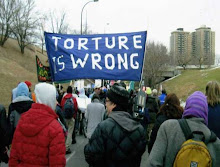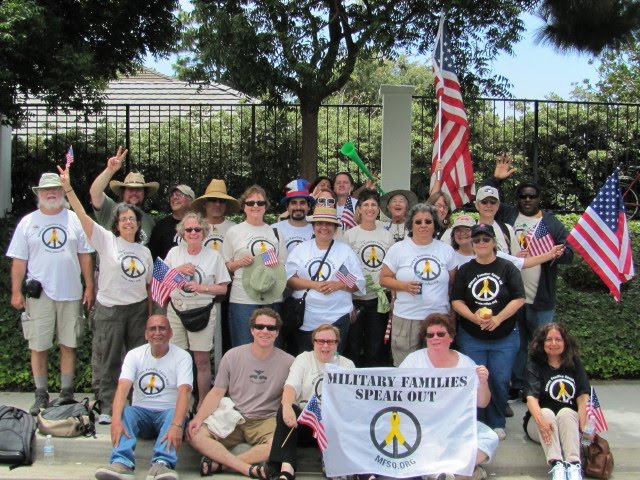December 4, 2008
When Barack Obama becomes president, he will inherit a human rights debacle in Iraq, now entering a phase in which the US appears ready to bulldoze thousands of its Iraqi prisoners over a legal cliff into Iraqi government prisons where they face the possibility of torture and execution.
The darkening future for the detainees comes with the approval on November 27, 2008, of the US-drafted Status of Forces Agreement (SOFA) by the Iraqi Parliament. The agreement requires that on January 1, 2009, the US:
"Shall provide the Government of Iraq available information on all detainees who are being held by them. Competent Iraqi authorities shall issue arrest warrants for persons who are wanted by them. The United States Forces shall act in full and effective coordination with the Government of Iraq to turn over custody of such wanted detainees to Iraqi authorities pursuant to a valid Iraqi arrest warrant and shall release all the remaining detainees in a safe and orderly manner."
On the face of it, the agreement sounds just. An examination of the situation on the ground suggests the opposite.
Sunni Gulag
The US began capturing Iraqis on a wholesale basis in 2003 with the invasion. World attention was focused on the fate of Iraqi detainees by the revelations in 2004 of detainee torture by US forces at Abu Ghraib prison. Because of Abu Ghraib, the US improved the physical conditions of detention, but detentions increased in 2007 as a fundamental tactic of the US military "surge." Iraqis were, and continue to be, arrested on a daily basis, with those deemed not threatening set free.
Since the beginning of the occupation, as many as 90,000 Iraqis have been imprisoned by US forces, according to a spokesperson for Task Force 134 (TF-134), the US command running the US prison system in Iraq. The total number of Iraqis in detention at any one time reached a peak of nearly 26,000 in October 2007, according to figures provided by TF-134. By November 2008, with the reduction in numbers of detentions in 2008 and the release of detainees, the number of Iraqis in US prisons had declined to about 15,900, according to TF-134.
In August 2008, a TF-134 spokesperson reported that approximately 80 percent of the detainees were Sunni. The larger proportion of Sunni captives may result from greater resistance to the occupation in the Sunni community, but it is likely also the result of government forces being under the control of the Shia-dominated government. "Most detainees were captured as the result of an Iraqi-generated warrant for some act that would classify them as a threat," according to a TF-134 spokesperson, commenting on the process leading to capture.
During the debate preceding the passage of SOFA, Sunni legislators, according to Reuters, demanded that detainees without charges against them be freed. As will be discussed, this would free all of the US-detained Iraqis.
No Legal Rights, No Evidence
Iraqi detainees in the US prisons are being held without charges, without access to lawyers and without appearance before any judicial body - all violations of international law. This has been a continuing concern of the United Nations (UN) and international human rights groups, but totally ignored by the US and the Iraqi occupation government.
For example, a human rights report of the UN Assistance Mission to Iraq (UNAMI) released December 2, 2008, said that the agency continues to be concerned about the imprisonment of detainees by US forces "without judicial review of their cases" as well as about "administrative review procedures that do not fulfill the requirement to grant detainees due process in accordance with internationally recognized norms." A UNAMI report in 2007 made the identical point.
A 2006 Amnesty International (AI) report, reflecting the concerns of numerous human rights groups, said: "Since the invasion of Iraq in March 2003 tens of thousands of people have been detained by foreign forces, mainly the US forces, without being tried and without the right to challenge their detention before a judicial body." AI made a similar observation in a November 28, 2008, statement of concern about transfer of Iraqi detainees from US to Iraqi custody.
In October 2008, a spokesperson for TF-134 said in an e-mail: "There is no place for legal representation in the THREAT BASED system that we operate."
Now it appears, based on a November 23, 2008, report from the Associated Press (AP), that the vast majority of detainees are also being held without any hard evidence. The AP said that the US intends to release most of its detainees under SOFA, but that it is "rushing to build criminal cases against some 5,000 detainees it deems dangerous." The report contained the remarkable admission attributed to Brig. Gen. David Quantock, commander of TF-134, that the US has evidence against "only a few hundred" of those detainees considered most dangerous.
"At the end of the day," the AP quotes General Quantock, "if there's not enough facts to justify a court case (in the Iraqi Court system), then we'll have to release ... We have a lot of work to do."
Iraqi Court System Tilted
The basic premise of the terms of the SOFA detainee section, and the reported rush by the US to build cases against detainees, is that the Iraqi judicial system is fair, open and impartial.
Karen Parker, a noted international human rights lawyer, says that the Iraqi judicial system does not meet international standards. The 2007 UNAMI report elaborates on her point:
"Serious pretrial irregularities (in Iraqi courts), which prejudice the chances of subsequently receiving a fair hearing, include the failure to bring defendants before an investigative judge within a reasonable amount of time, and failure to promptly apprise detainees of the reason for their arrest and of the details of the charges and evidence against them ... The vast majority of defendants are represented by counsel appointed by the court, whom they have never met and who have little or no knowledge of the substance of the charges or evidence against their clients ... Proceedings at trial are typically brief in nature, with sessions lasting an average of some fifteen to thirty minutes, during which the entire trial is concluded. Deliberations also typically do not last more than several minutes for each trial, including complex cases resulting in life imprisonment or the death penalty ... Denial of prompt and adequate access to counsel, and lack of continuity in legal representation, mean that in many cases those convicted lose the opportunity to appeal their sentences as they become aware of their rights only after the deadline for submissions has passed."
The UNAMI report noted that trials in the flawed Iraqi court system "are increasingly leading to the imposition of the death penalty."
The Iraqi courts are not able to operate freely, Ms. Parker said, in part because judges and lawyers are often under intense political pressure and even fear for their lives, with the division between Sunni and Shia a major factor.
In January 2008, for example, gunmen assassinated Iraqi appellate court Judge Amir Jawad al-Naeeb, a Sunni, who, The New York Times reported, was considered by Baghdad lawyers and judges to be "one of the country's most competent and even-handed judges."
The Iraqi Lawyers Association reported in 2007 that at least 210 lawyers and judges have been killed since the invasion; that, according to IRIN News.org, hundreds of legal workers had left the country because of threats and persecution, and that:
"With tensions so high in Iraq between the Sunni and Shia Muslim communities, legal workers are being put under intense pressure to make judgments according to religious sect. Lawyers often find themselves in a lose-lose situation."
Jonathan Hafetz, of the American Civil Liberties Union, who is representing two detainees in US custody, agreed with Ms. Parker that the Iraq judicial system does not meet minimum standards for impartiality and due process, and he said that the system is tilted against Sunni defendants. With respect to the detainees, he said the length of time that they have been held without charge is alone a significant enough factor to prevent them from having a fair trial or hearing.
"Danger in the Custody of Others"
Ms. Parker says that international law allows prisoners to be turned over to a justice system only if that system it meets international standards for independence and fairness. In addition, under international law as well as US military standards as set forth in US Army/Marine Corps Counter-Insurgency Manual:
"There are certain conditions under which US forces may not transfer the custody of detainees to the host nation (in this case Iraq-Ed.) or any other foreign government. US forces retain custody if they have substantial grounds to believe that the detainees would be in danger in the custody of others. Such danger could include being subjected to torture or inhumane treatment."
The Iraqi detention system is widely believed to treat prisoners harshly and only slowly, if at all, processes its detainees through the justice system.
"We find a lot of mistakes and mistreatment in the Iraqi-run prisons as a remarkable number of their facilities are not fit for those detainees and those who are in charge do not have enough knowledge of human rights, so ill treatment can occur, " said Basil al-Azawi, who is head of the Commission for Civil Society Enterprises, an umbrella group of over 1,000 Iraqi NGOs, as reported November 17, 2008, by IRIN.
"A suitable life inside the prisons must be guaranteed according to the Iraqi constitution and law. More visits to Iraqi prisons must be allowed by international and local human rights activists, and the treatment [of prisoners] must not be based on their sectarian background," al-Azawi is quoted as saying in a November 2, 2008, IRIN report.
An Iraqi parliamentarian, Mohammed Al-Dainy, held a press conference in Geneva on October 31, 2008, charging that Iraq has 420 secret detention centers where "conditions are much worse than in the official prisons." He said that 40,000 are being held in Iraqi government prisons and that this is one-quarter of the total number of people being held by the government.
The UNAMI 2007 report indicates that mistreatment of prisoners in Iraqi custody is a long-standing problem. The UNAMI, the report said, "remains concerned about the continuing failure of the Iraqi government as a whole to seriously address issues relating to detainee abuse and conditions of detention ... The authorities have yet to demonstrate the political will to hold accountable law enforcement personnel suspected of involvement in torture and other abuse of authority ... The continuing failure to take decisive action in this regard can only serve to encourage the climate of impunity that prevails today ..."
Visiting a National Police detention center in the northwest Baghdad suburb of Kadhimiyah in July 2007, Molly Hennessy-Fiske reported in The Los Angeles Times that the facility had been built to hold 300 detainees but that it then held nearly 900. She observed:
"The stench of human confinement intensified as the guard led the way to the back of the room and down a dark, flooded hallway to the bathroom, where half-naked detainees stood barefoot amid muddy puddles, broken floor tiles and stopped-up urinals. A shower and sink were filled with human waste.
"The guard dropped his cigarette butt in a puddle as detainees relieved themselves in two holes and rinsed off under a broken water pipe."
Hennessy-Fiske said that "Col. Daniel Britt, who heads the US military's National Police Transition Team, which advises the detention center staff, said the conditions were 'appalling' but met international standards. US soldiers visit almost daily ..."
In May 2007, Joshua Partlow reported in The Washington Post that Deputy Justice Minister Pusho Ibrahim Ali Daza Yei acknowledged overcrowding in Iraqi prisons, and the article went on to say that it had been reported that "beatings and torture are common." An anonymous UN official was quoted commenting on one Iraqi jail:
"Routine beatings, suspension by limbs for long periods, electric shock treatment to sensitive parts of the body, threats of ill treatment of close relatives. In one case, one of the detainees said that he was forced to sit on a sharp object which caused an injury."
The 2008 UNAMI report affirms that gross mistreatment of detainees continues in Iraqi prisons:
"Ongoing widespread ill-treatment and torture of detainees by Iraqi law enforcement authorities, amidst pervasive impunity of current and past human rights abuses, constitute severe breaches of international human rights obligations and represent examples of challenges faced by the Iraqi government."
Los Angeles Times staff writer Tina Susman, reported in September 2008 that she interviewed prisoners in Iraqi government jails who had been held for 18 months and longer without access to any judicial hearing or explanation of their detentions.
In the Kurdistan region of Iraq, security forces known as Asayish operate control of the regional government's Ministry of Interior, according to a 2007 report by Human Rights Watch and based on research conducted in 2006. HRW interviewed many former detainees and reported that the system regularly violated Iraqi and international law. The report lists violations, including "... failure to inform detainees of the grounds for arrest, failure to bring detainees before an investigative judge in a timely fashion, failure to provide a mechanism by which suspects can appeal their detention, failure to provide a trial without undue delay, failure to provide access to legal representation, holding suspects for prolonged periods of pretrial detention, and extracting confessions through coercion."
An amnesty law passed by the Iraqi parliament in February 2008 was supposed to facilitate the release of Iraqi prisoners, but the process has been very slow, with only several thousand having been released, according to Susman's informants.
Currently, the US funds lawyers and trains Iraqi judges in order to improve Iraq's justice system. (The US has spent $50 million on Iraqi court facilities and $10 million in training lawyers.) However, that funding could stop with changes arising from the new security agreement. One Iraqi lawyer told Susman, "If the Americans stop providing the money, I don't think the Iraqi government will sponsor us."
Third Party Solution
Ms. Parker said that under international law, when the US arrests an Iraqi, it has the responsibility to make specific charges and state whether the detainee is being held on criminal charges or as a prisoner of war: "Basically, people 'detained' for reasons related to an armed conflict have a right to challenge their status - either as POWs (prisoners of war), civilian detainees or those with criminal charges."
All, she said, must have legal representation, be provided with legal counsel if they are indigent and have a forum for their defense that meets international judicial standards.
Ms. Parker cited a UN draft guidelines and principles document on human rights and terrorism, prepared by Kalliopi K. Koufa, Chairperson-Rapporteur of the Working Group on Human Rights and Terrorism of the former UN Sub-Commission on Human Rights, laying out rights of a person arrested as a terrorist, which include:
"Persons detained under suspicion of engaging in or planning terrorist acts at all times have the right to know the charges against them. A charge of being a terrorist is insufficient and must be accompanied with charges of specific acts."
International standards also require that a prisoner facing criminal charges must not only be represented by legal counsel, but must have his or her case presented in a judicial proceeding within four days, Ms. Parker noted, although there have been attempts to extend that period somewhat in terrorism cases.
If a person is held as a prisoner of war or a civilian detainee, Ms. Parker said, he may not be held in prisons, but in camps "that meet minimum Geneva Conventions standards." The Conventions spell out a highly detailed list of POW rights, including legal rights, the right to wear their own clothing, not prison garb, and protection against abusive interrogation.
Since the Iraqis in US prisons have been offered none of their rights under international law to challenge their confinement, Ms. Parker said, all the detainees should be released.
If this is not done, she continued, the next best alternative might be to have the detainees moved to a third-party country where hearings can be held before an internationally recognized judicial body. If detainees are held after their hearing, the US would have to place them in a facility in a country in which their rights would be protected.
Stakes Higher in Iraq
President-elect Obama is reported to be seeking a way to try prisoners from the US Guantanamo Detention Camp in US courts to at least give the impression of trying to achieve justice, however belated, for about 250 detainees. In Iraq, the stakes are higher for the US military and the Iraqi occupation government, who aim to keep off the streets thousands of people they view as threatening.
In addition, Ms. Parker said, the US wants its Iraqi detainees put into Iraqi prisons "to have one more step between them (the US) and a lawsuit," pointing out that the failure of the US to provide the Iraqis with due process makes it vulnerable to legal action by international human rights lawyers on behalf of the detainees. The transfer of the detainees, she said, "gets us (the US) off the hook." It is part of a "mad scramble," she said, in which the Bush administration is "hot and heavy covering its tracks."
Ideally, the UN and perhaps the European Union will intervene, demanding that all US detainees in Iraq be given amnesty, based if nothing else on the fact that they have been denied their legal rights. At a minimum, these bodies could call for open hearings in an internationally supervised court in which detainees would have legal representation.
The international community has proved ineffectual to the Iraqi detainees so far, however. Their hope most probably lies solely with their families, friends and supporters who will oppose their illegal disappearance into Iraqi prisons.
Nick Mottern and Bill Rau, t r u t h o u t
Subscribe to:
Post Comments (Atom)





























































































































No comments:
Post a Comment